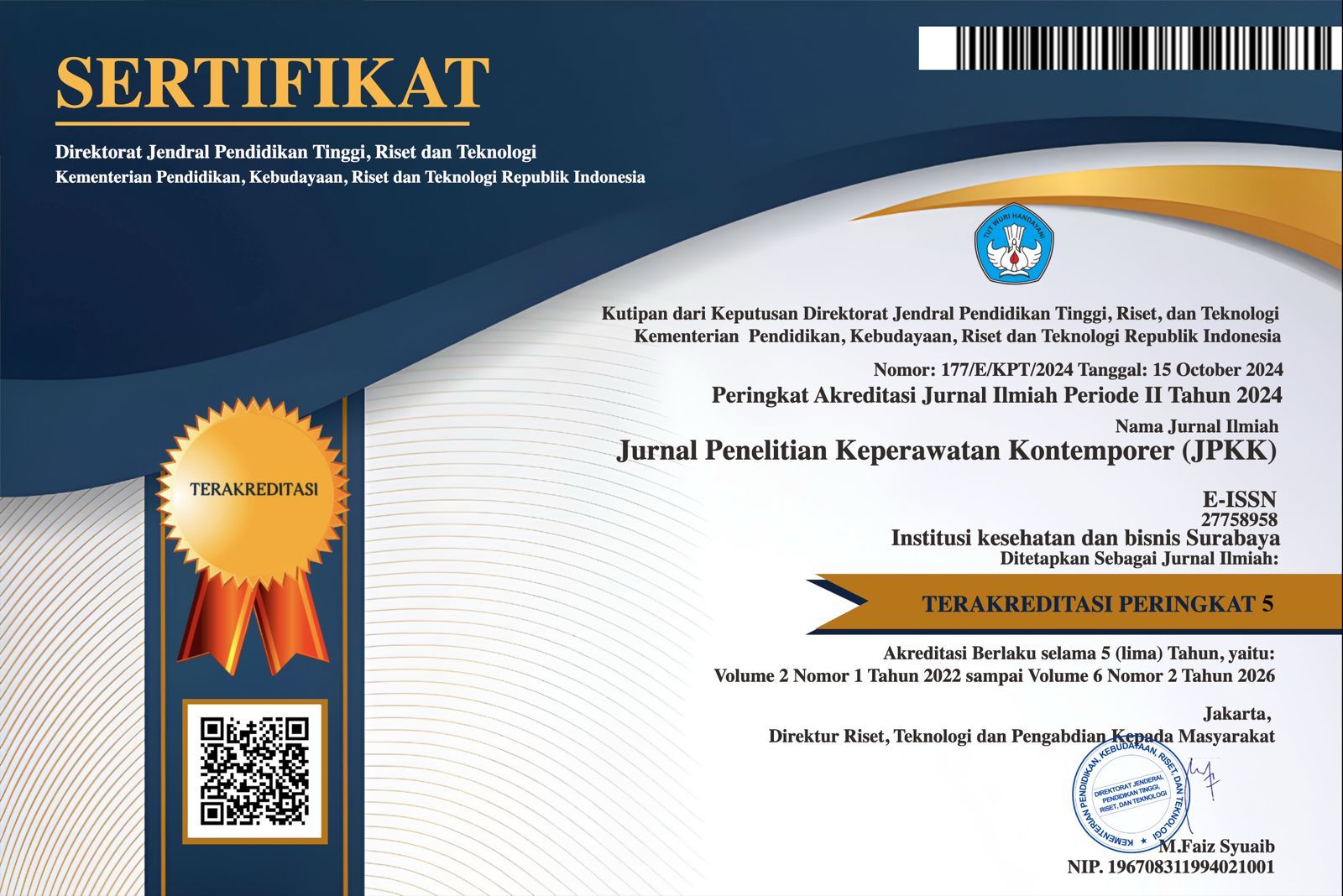THE INFLUENCE OF HEALTH EDUCATION ON THE HANDS WASHING TECHNIQUE OF STUDENTS AT THE TAFSIR BOARDING SCHOOL, SURABAYA
DOI:
https://doi.org/10.59894/jpkk.v3i1.535Keywords:
Health Education, Hand WashingAbstract
Background: One of the best ways to prevent the spread of disease is to maintain good hand hygiene. In the Islamic boarding school environment, students often interact closely, so maintaining hand hygiene is important to prevent the spread of disease. Aim: this study was conducted to evaluate the effect of health education on the hand washing technique of students at Islamic boarding schools. Methods: This study used an experimental method with a pre-test and post-test control group design. The research sample consisted of 60 students, who were divided into two groups, namely the control group (30 people) and the intervention group (30 people). The intervention group was given health education about proper hand washing techniques, while the control group was not given health education. Data was collected by means of observation before and after the intervention using a checklist of correct hand washing techniques. The results of the study showed that after the health education intervention was carried out, there was a significant increase in students' hand washing techniques in the intervention group compared to the control group. In the intervention group, there was an increase in the percentage of correct hand washing technique from 50% before the intervention to 90% after the intervention, whereas in the control group, the percentage of correct hand washing technique only increased from 50% to 55%. Conclusion: It can be concluded that health education can influence students' hand washing techniques at Islamic boarding schools.
References
2. Anggraini NV, Hutahaean S. Cuci Tangan Dalam Pencegahan Dan Pengendalian Infeksi Pada Masa Pandemi Covid-19. Jurnal Kreativitas Pengabdian Kepada Masyarakat (PKM). 2022;5(6):1927-1935.
3. Saputra A, Fatrida D. Health edukasi pentingnya cuci tangan pakai sabun (CTPS) di Sekolah Dasar Negeri 2 Mangunjaya. Khidmah. 2019;2(1):31-38.
4. Wisudawati ERS, Romadhon M. Hubungan pengetahuan dan sikap terhadap tindakan cuci tangan pakai sabun (CTPS). Jurnal Kesehatan Dan Pembangunan. 2021;11(21):28- 34.
5. Diyantara IP, Rawalillah H. HUBUNGAN ANTARA TRIAS UKS DENGAN KEBIASAAN CUCI TANGAN PAKAI SABUN (CTPS) PADA SISWA SD NEGERI
14 PALEMBANG TAHUN 2019. Jurnal Kesehatan Bina Husada. 2020;12(02):75-79.
6. Amir H. Penyuluhan Kesehatan Tentang Diare di Rumah Sakit Ibnu Sina Kota Makassar. Jurnal Abdimas Berdaya: Jurnal Pembelajaran, Pemberdayaan Dan Pengabdian Masyarakat. 2022;5(01):1-5.
7. Husni E, Ramadany S. Praktek Cuci Tangan Pakai Sabun Pada Siswa Sekolah Dasar 05 Nagari Mungka Kabupaten Lima Puluh Kota. Buletin Ilmiah Nagari Membangun. 2019;2(4):254-260.
8. Saptiningsih M, Wijaya YM, Maagdelena M. Faktor-faktor yang berhubungan dengan perilaku mencuci tangan pada anak sekolah dasarnegeri 03 kertajaya padalarang. J Nurs Public Heal. 2019;7:62-71.
9. Parasyanti NKV, Yanti NLGP, Mastini IGAAP. Pendidikan kesehatan cuci tangan pakai sabun dengan video terhadap kemampuan cuci tangan pada siswa SD. Jurnal Akademika Baiturrahim Jambi. 2020;9(1):122-130.
10. Zuliyanti NI, Rachmawati F. Pengaruh Penyuluhan Perilaku Hidup Bersih dan Sehat Terhadap Praktik Cuci Tangan 6 Langkah Siswa SD N 2 Pangenrejo Purworejo. Jurnal Komunikasi Kesehatan. 2020;11(1).
11. Syah DZR, Utari D, Adinugraha TS. Edukasi Penerapan Protokol Kesehatan Penyelenggaraan Kegiatan Pada Masa Pandemi Covid 19 Di Tpq Masjid Awalulmu’Minin Gamping. Jurnal Pengabdian Masyarakat Karya Husada (JPMKH). 2020;2(2):28-33.
12. Antari I, Riandani SD, Siwi IN. Efektivitas penggunaan media video dan leaflet terhadap perilaku mencuci tangan dalam pencegahan diare. Published online 2020.
13. Taadi T, Setiyorini E. Faktor yang berhubungan dengan kepatuhan cuci tangan 6 langkah moment pertama pada keluarga pasien di ruang anak. Jurnal Ners Dan Kebidanan (Journal of Ners and Midwifery). 2019;6(2):203-210.
Downloads
Published
How to Cite
Issue
Section
License
All articles published by Jurnal Penelitian Keperawatan Kontemporer (JPKK), the authors hold the copyright under license Creative Commons Attribution License.











